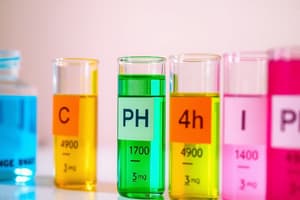Podcast
Questions and Answers
What is the pH level of normal rain or snow?
What is the pH level of normal rain or snow?
- 4.0
- 6.5
- 5.6 (correct)
- 7.0
What is a consequence of spring acid shock?
What is a consequence of spring acid shock?
- Dramatic lowering of water pH (correct)
- Decrease in water temperature
- Reduction of sediment in water
- Increase in biodiversity
Which of the following acids is a component of acid rain?
Which of the following acids is a component of acid rain?
- Sulfuric acid (correct)
- Peracetic acid
- Hydrochloric acid
- Carbonic acid
How do scrubbers help control acid effects?
How do scrubbers help control acid effects?
What is the purpose of catalytic converters?
What is the purpose of catalytic converters?
What is the pH range that indicates a basic substance?
What is the pH range that indicates a basic substance?
Which of the following correctly describes the taste of acids?
Which of the following correctly describes the taste of acids?
What is the effect of acid rain with a pH as low as 3 on living organisms?
What is the effect of acid rain with a pH as low as 3 on living organisms?
What is produced as a result of the neutralization reaction between an acid and a base?
What is produced as a result of the neutralization reaction between an acid and a base?
Which indicator turns red in the presence of an acid?
Which indicator turns red in the presence of an acid?
What characteristic change does a universal indicator exhibit when it reacts with a solution?
What characteristic change does a universal indicator exhibit when it reacts with a solution?
What is the pH value of neutral substances?
What is the pH value of neutral substances?
Which property describes the feeling of bases?
Which property describes the feeling of bases?
Flashcards
Acid Rain/Snow
Acid Rain/Snow
Rain or snow with a pH lower than 5.6, caused by acidic compounds like sulfur dioxide and nitrogen oxides.
Spring Acid Shock
Spring Acid Shock
The process of water becoming significantly more acidic in the spring due to acidic deposits melting from the winter.
Neutralizing Agent
Neutralizing Agent
A chemical compound that neutralizes acid, reducing its acidity.
Scrubbers
Scrubbers
Signup and view all the flashcards
Catalytic Converter
Catalytic Converter
Signup and view all the flashcards
Acid
Acid
Signup and view all the flashcards
Base
Base
Signup and view all the flashcards
Indicators
Indicators
Signup and view all the flashcards
Litmus
Litmus
Signup and view all the flashcards
Neutralization
Neutralization
Signup and view all the flashcards
pH Scale
pH Scale
Signup and view all the flashcards
Acid Rain
Acid Rain
Signup and view all the flashcards
How is acid rain formed?
How is acid rain formed?
Signup and view all the flashcards
Study Notes
Acids and Bases
- Acids are chemicals that produce acidic substances with a pH less than 7.
- Bases are chemicals that produce basic substances with a pH greater than 7.
Properties of Acids and Bases
-
Acids:
- Taste: Sour
- Feel: Stinging
- Acidic
-
Bases:
- Taste: Bitter
- Feel: Slippery
- Basic
-
Tasting and feeling unknown chemicals is unacceptable for identification.
Indicators
- Indicators are substances that change colour when reacting with acids and bases.
- Bromothymol Blue and Universal Indicator are examples.
- Universal Indicator has a range of colours based on pH.
Litmus
- Litmus is a chemical indicator, a mixture of plant compounds extracted from lichens.
- Litmus is light pink before reactions.
- In the presence of acid, litmus turns red.
- In the presence of base, litmus turns blue.
- Litmus provides an approximate measure of acidity or basicity.
Neutralization
- Acids and bases react together when mixed, forming a neutralisation reaction.
- Both acid and base are used up in the reaction.
- A salt and water are produced.
pH Scale
- The pH scale is a more specific way to compare acids and bases.
- The scale ranges from 0 to 14.
- A pH of 7 is neutral.
- Lower than 7 is acidic.
- Higher than 7 is basic.
- Each pH unit represents a 10-fold increase.
- Universal indicator or pH paper changes colour based on the pH
- Colours can be matched to a chart to determine the known pH value
Acid Rain
- Rainwater is naturally slightly acidic.
- When rainwater combines with atmospheric chemicals (like sulfur dioxide or nitrogen dioxide), it results in acid rain, which can have a pH as low as 3 in some places.
- This can have damaging effects on living organisms.
- Normal rain/snow has a pH of 5.6.
- Anything lower than 5.6 is considered acid rain/snow.
- Acid rain can lower the pH of water in lakes, further damaging the surrounding environment.
- Acids that contribute to acid rain include sulfuric acid, sulfurous acid, nitrous acid, nitric acid and carbonic acid.
Neutralizing Acidic Lakes
- Acidic lakes can be treated with lime (calcium hydroxide) to neutralize them.
- The lime is mixed with water and dissolves, forming a base.
- The chemical reaction between the limewater and the lake's dilute sulfuric acid produces calcium sulfate and water.
Using Chemistry to Control Acid Effects
- Scrubbers: Limestone mixed with water absorbs sulfur particles in toxic gases, preventing them from entering the atmosphere.
- Catalytic converters: Ceramic or wire honeycomb coated with metals (like platinum) act as catalysts for complete combustion. This reduces the formation of carbon monoxide and nitrogen oxides.
Acid Rain Impact Visual representation
- Visual depictions of the impact of acid rain on the environment.
Studying That Suits You
Use AI to generate personalized quizzes and flashcards to suit your learning preferences.




